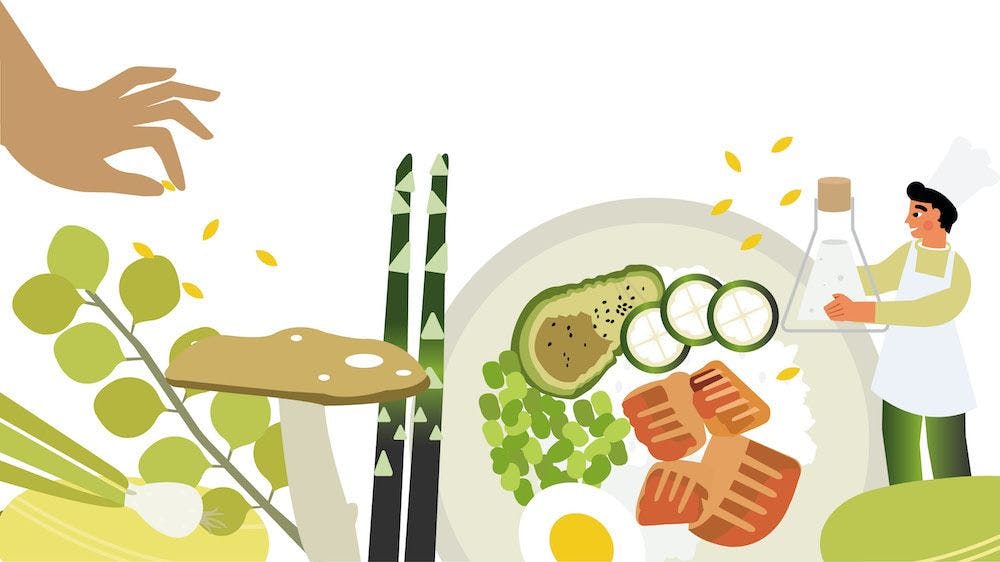
Stuck in a food rut, cooking the same old meals over and over again? Here, mindfulness teacher Adamantia Velonis explains how to put wellbeing firmly on the menu
You may have heard of ‘mindful eating’ – taking the time to tune-in to the smells, flavours, and textures of our food – but have you considered starting the process before you plate-up? In ‘mindful cooking’ an awareness of the ‘here and now’ is cultivated at all stages of cooking: from selecting ingredients, to preparing a meal, and even being deliberate about how you spend your time while waiting for various elements to be ‘done.’ But, like mindful eating, mindful cooking can help us develop a deeper relationship with ourselves – here’s how…
1. It can help you manage difficult emotions, such as anxiety or stress
Cooking is deeply immersive, as all our senses are stimulated simultaneously – from texture, to taste, sound, temperature, visual cues, and the many aromas. By distracting us from unproductive thoughts, and providing feelings of control or mastery, cooking can support stress management.
It provides a ‘pause’. We have to focus on the task at hand, and this can help to shift our mindset when we return to the problem we are facing later.
The methodical nature of cooking reminds us of the importance of breaking tasks down into smaller parts, so that they feel less overwhelming. Mindful cooking gives us the space to see the lessons in the process, so that they can be applied to challenges outside of the kitchen, too.

2. It's an accessible form of self-care
Self-care is any activity that we do to specifically look after our wellbeing – whether physical, emotional, or mental. It’s an activity that we enjoy and can keep coming back to because it ‘revitalises’ us. Mindful cooking is an easy way to schedule in some essential self-care because we all need to eat. Over the weekend, we might block out some alone time in the kitchen to try our hand at a technique that challenges us, or we might make a favourite meal with a loved one during the week to connect through a shared activity.
3. It improves our mental focus
We are constantly distracted by our devices and the digital environment. But, by bringing mindfulness to the cooking process, we can train our awareness. We can be deliberate about creating a calm, distraction-free environment before cooking – leave your phone in the other room, try using physical cookbooks, or turning off notifications if you’re using an online recipe. Think about how you are going to manage your time if it’s a more involved recipe, and develop a ‘game plan’. This will make it easier to remain focused once you start, and you will be less likely to be interrupted.
4. It helps to develop personal confidence
There is an art to following a recipe and mastering the fundamentals. But, beyond that, a recipe is merely a guide. Taste isn’t objective, and it is deeply linked to our personal memories and early experiences. Mindful cooking helps you to develop an awareness of your palate and have the confidence to express it. Seen in this light, cooking is an opportunity to be creative in daily life, to use our instincts to judge when something is ‘done’, and to be attentive to the ingredients we’re using. Feeling confident about knowing when you can improvise in the kitchen can help you to apply creative problem-solving to
other areas of your life.

5. It helps you connect with loved ones or your community
Cooking ignites the senses, especially smell. Interestingly, our sense of smell is deeply connected to our involuntary memory. This is why we often turn to our favourite comfort foods, because making a meal that we associate with a positive time in our lives can help us access those feelings in the present. Be aware of this emotional aspect of food and prepare recipes that are meaningful to you. For example, a favourite childhood meal or a dish made as part of cultural celebrations. Setting a loving intention before we cook encourages us to extend this feeling of warmth to other aspects of our lives. Seeing cooking as an opportunity to extend your mindfulness practise, can turn cooking from being purely functional to a self-development journey.
To connect with a nutritionist or learn more about mindful cooking, visit nutritionist-resource.org.uk/

